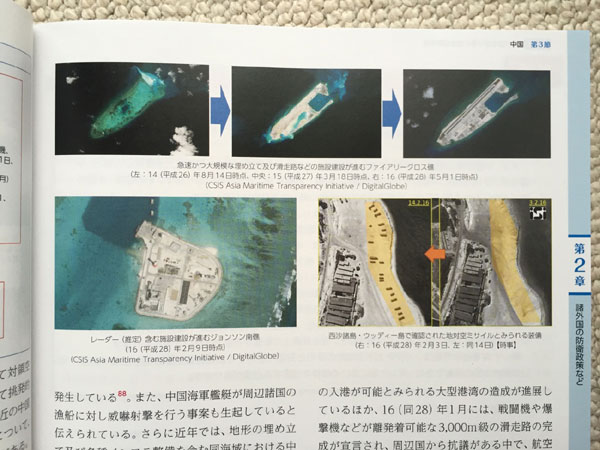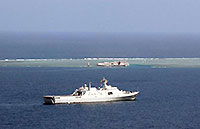Japan's defense white paper makes irresponsible accusations against China
By Cai Hong in Tokyo (chinadaily.com.cn) Updated: 2016-08-02 14:52
 |
|
In its 2016 defense white paper, Japan interferes in the South China Sea. [Photo by Cai Hong/chinadaily.com.cn] |
On August 2, Japanese government approved this year's version of defense white paper, which described the security environment surrounding the country "increasingly severe". It highlighted "more tangible" and "acute" challenges and destabilizing factors.
The white paper went to great lengths to define China as one of the "destabilizing factors" along with Democratic People's Republic of Korea.
It made irresponsible accusations against China, claiming that China continues to act in an "assertive" manner, including attempts at changing the status quo by coercion. China's "dangerous acts" in the South China Sea and East China Sea could cause unintended consequences.
On June 8, three Russian naval ships entered the waters close to the Diaoyu Islands. The Japanese Maritime Self-Defense Force destroyer Hatakaze quickly followed them into that area. In response to the Hatakaze's entry, the Chinese Jiangkai I-class frigate rushed into the waters, according to the Japanese weekly Nikkei Asian Review.
Hiding the first part of the episode, the white paper criticized China for its frigate's entry into Japan's "contiguous" zone near the disputed islets in the East China Sea. (To overblow Chinese ship's entry, Japan's foreign ministry summoned Chinese Ambassador to Japan Cheng Yonghua in the tee hours of that day, and lodged a protest.)
Refusing to have a territorial dispute in the East China Sea, Japan is unlikely to talk with China over its settlement, leaving the waters near the islands a minefield.
The white paper, the first after Japan's security legislation went into effect in March, played up the so-called "gray zone" situations, or neither pure peacetime nor contingencies over territory, sovereignty and economic interests.
The white paper served as an implementation scheme for the controversial security bills that enable Japan's Self-Defense Forces to play a more comprehensive global military role and allow implementation of the new US and Japan alliance guidelines.
The legislation provides greater flexibility, responsiveness, and interoperability for training, exercises, and planning on a broader spectrum of security issues by easing restrictions on Japanese Self-Defense Force operations, including the ability to exercise collective self-defense. This will empower Japan to be an active player at the region and global stages.
The defense legislation eliminates geographic constraints by substituting a situational threshold (situations that "gravely affect the peace and stability of Japan") rather than limiting support to "situations in areas surrounding Japan". It authorizes support to non-US troops.







